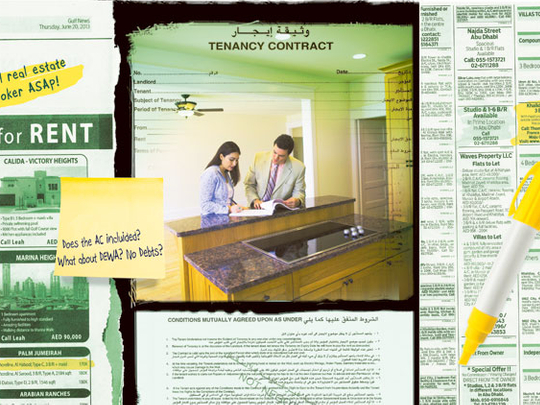
“Finding a property to rent is fairly straightforward and assuming the budget matches the market, then finding [a place] should take no time at all. We suggest that tenants look around two to three weeks before their move in date,” says Mario Volpi Head of Sales and Leasing Residential, UAE at Cluttons
With rental scams in the headlines more than once, Better Homes advises only dealing with a trusted real estate agency. Check to confirm it has a trade license and their agents have a broker’s license.
Volpi warns against using unknown freelancers. “Use an agent you have heard of and one that has helped others you know,” he said.
Check the condition of the property
The landlord by law is obliged to hand over a in working order property, so check its physical state. Remember electricity and water only gets connected when the lease is already signed, so any power, air conditioning or plumbing issues won’t show up immediately. Make sure a clause is included in the contract, which states you have a couple of days after moving in to report these issues and the landlord is obliged to sort them out. “Check that the final bill for the electricity, water and air conditioning provider has been paid by the outgoing tenant or landlord, preferably before signing the tenancy agreement,” Volpi advises.
Also make sure that no service fees are outstanding, as once cheques are handed over it can be very difficult to get owners to pay up. “The law is silent as to whose responsibility it is to pay for the service fees. However, it requires the landlord to provide the property in a condition the tenant can enjoy. If the landlord does not pay the service fees and the tenant’s use of the property is interfered with, this would constitute breach of tenancy laws by landlord. In such event, the tenant could seek recourse against the landlord through the Rent Committee,” says Ludmila Yamalova, from HPL Yamalova & Plewka JLT legal consultancy.
Firozi recommends getting a document from the developer, or the owners association, that confirms all services have been paid up to date by the landlords, “So they are not barred from using any facilities in the building.”
- Legal ownership
Don’t rent on trust. “Make sure there is a title deed or Oqood on the property,” says Volpi. Ask to see the original title deed or check in the land department’s registry (Oqood) and get a passport copy of the landlord. “Check the name on the title deed or ownership document is the same as on the tenancy agreement, if not make checks for any power of attorney documentation,” Volpi adds.
And remember, subletting is illegal. Better Homes warns that if you are subletting the property, the actual tenant should have written authorization to do so from the landlord.
- The contract
The first rule is to read the contract thoroughly for all clauses on maintenance and charges. They are not uniform, but standard contracts usually have clauses added by agents - these are the ones that must be read carefully.
These should include provisions to deal with the early, unscheduled breaking of the lease, according to Volpi. There is usually a fine of two months rent.
“Make sure there are provisions on the tenancy contract that stipulates the responsibility of maintaining the property. Minor maintenance is normally paid by the tenant and major maintenance by the landlord,” he adds. Ask the agent to include a checklist on the condition of the property.
“It is advisable to have a proper check-in procedure, as this will ensure the tenant has a smooth exit at the end of the tenancy and help to ring fence the deposit,” Volpi says.
- Signing the lease
Better Homes recommends signing the lease in presence of the landlord and ensuring that any other signatory has the necessary, valid authorisations. Cheques shoud be issued in the name of the landlord only. If cheques are issued to a real estate management company, then they should have a notarized power of attorney authorizing them to receive cheques on behalf of the landlord.
All rental agreements have to be registered on the Real Estate Regulatory Agency’s (RERA) on-line Ejari system. In case of any disputes the rent committee will ask for the Ejari certificate. “Ensure that the landlord knows that it is a legal requirement to register the tenancy at Ejari and should also be responsible for the registration cost,” Volpi said.


